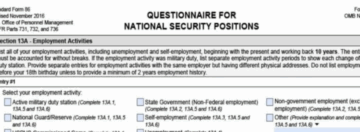Tips for Filling out Employment Activities on the SF-86

There are lots of questions on this site from security clearance applicants regarding what or how to list employment activities in Section 13A on the SF-86. The more accurate and thorough you are, the easier it is for investigators and records custodians to verify the information and check the block. That in turn helps speed up the process of getting your background investigation closed. Here are some tips from the National Background Investigations Bureau to help applicants:
– List ALL jobs beginning with the present and back 10 full years with no breaks. No job is too short or insignificant to list.
– Do NOT list tentative or future employments.
– Do not stretch employment dates to fill gaps when you were really unemployed for a month or more.
– In addition to the employer location, ensure you provide your physical work location.
– Ensure you have current up-to-date contact information for supervisors.
Pay particular attention to these questions listed after each employment entry:
– For this employment have any of the following happened to you in the last seven (7) years? Fired, quit after being told you would be fired, left by mutual agreement following charges or allegations of misconduct, left by mutual agreement following notice of unsatisfactory performance.
– For this employment, in the last seven (7) years have you received a written warning, been officially reprimanded, suspended, or disciplined for misconduct in the workplace, such as a violation of security policy?”
Whether or not you agree, if the employer would say that you were fired, terminated, or left under unfavorable circumstances, list it and explain the circumstances. If you had ANY discipline, warnings, reprimands, list it (verbal, written, formal and informal, etc.) This will alleviate any appearance of lack of candor if something does pop up during the course of the background investigation and shows you have accepted responsibility and put it behind you.



Good advise, but I would like to add a few additional suggestions -
If you work a summer job in the summer of 2015, Summer 2016, and Summer 2017, do not list that you worked at this job from May 2015 to August 2017. You worked at this job from May 2015 to August 2015, May 2016 to August 2016, and May 2017 to August 2017 WITH periods of UNEMPLOYMENT from August 2015 to May 2016 and August 2016 to May 2017. You can list these 3 periods of employment with the same employer as 3 separate employment items or utilize the “additional periods of employment” option within the employment item.
If you are a 1099 employee with any company, you are SELF-EMPLOYED. When self-employed, list a verifier who actually has direct knowledge of your self-employment (i.e. customer, client, not your best friend whom you never did work for/with).
Do not check that you are a state employee if you are a city/local government employee.
Do not list someone you have never met as your supervisor (i.e. a random person in HR).
If you work for a temp agency, list the TEMP AGENCY as your employer. The company you are placed at is the Job Location.
If unemployed, list a person who you actually saw while unemployed who can account for your activities during this period of your life. Do not list the random man/lady at the unemployment office.
I am sure there is more, but that is all I can think of now.
And my final PSA, listing correct employment information is especially important for the Tier 1-3 cases where you might not ever meet with an investigator. Letters are sent to employers (on some of these case types) to verify your employment, this cannot be done if you list incorrect information. It will also delay the process if the letters are sent back undeliverable. It could also be a problem if the employer shows no record of your employment (because in reality you worked for a temp agency, for example). All these things DELAY background investigations. As for the T4/T5 cases, you will be able to clarify information to your BI, but if these employments are in different areas, an investigator might already be assigned the work before you ever get a chance to sit down with an investigator. That other investigator is then spinning their wheels searching for people who do not exist. Utilize the comment section if you need to explain some oddity in the employment.
First time applicant here. Does anyone add the tentative offer job that is the reason for the SF-86 as one of the entries under section 13? I know that all others and the current full time job need to be added. Thanks.
No. If you haven’t started, don’t list it.
Why would you list a job you are not legally employed at?
A tentative offer doesn’t mean anything beyond tentative; it also means that offer can be rescinded at any time.
I would also like to add: Do not list your jobs going back 20-30 years. Follow the instructions listed on the case papers, either 7 or 10 years. If they are auto filled from a previous form, delete employments that are out of scope/range. If it’s on the case papers it needs to be discussed. We don’t need to discuss how you were unemployed in 1964, or how you lived in CA in 1980 and worked in NY.
Several years ago I spent approximately 5 hours with a Subject trying to clarify 35 years of work and residential history (with some non-degree education). The Subject was a first time submitter and smugly told me at the beginning that since “we” wanted so much information, he filled out his form from 18 years old to "present’. The dates and locations for these activities did not align.I wasn’t happy and he certainly wasn’t happy at the end. Glad as a fed we don’t do this anymore.
This was the same knucklehead that didn’t believe me when I told him to get a conference room or private office because we were going to be several hours. We ended up in an oversized utility room with no table. Some Subject interviews you never forget.
You’re a trooper for dealing with no table. I hate when a Subject does that to me.
I had a bigwig at a DOE facility get hostile from the get-go, he had been through the process for years and he told me, we don’t have to go through each line of the SF-86, other investigators didn’t do that, he swears everything is accurate, his time is too valuable, it’s ridiculous I want so much of his time, on and on and on…
You already know the ending, of course the SF-86 wasn’t filled out correctly.
I have to say though, the most ridiculous Subject interview stories, at least for me, were when union reps were allowed to sit in.
Nightmare.
The union reps (IRS) didn’t bother me as I was able to maintain control during one interview. Call or email me sometime and I will tell you an amusing story about the local TEU president and I.
Will do! I’m sure it is great!